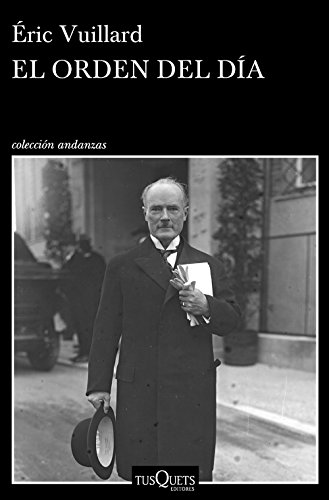Under the protection of historical fiction, Eric Vuillard He takes the opportunity to offer us a literature that ends up escaping from its scenography to represent more interesting things, which escape the very context of the historical moment in question. Stories that point to the notion that the purely human escapes the moment, circumstances and trends.
From the anecdotal and with an undeniable cinematographic point, Vuillard draws on his characters and an almost always anticipated vision of transcendent events, to dispose of ourselves with the idea that we can always find ourselves in the prelude to something transformative, for better or for worse. With its usual disguise of revolution, with its undeniable notion of a self-fulfilling prophecy based on repeated movements ...
And so the historical novels by Vuillard they become chronicles of the disaster, previews, outlines of the essential reasons that end up being forgotten in the middle of the war or revolution of the moment. Because once we have entered the closure of the ideal, the anecdotal spark that precipitates everything is seldom evoked and that always threatens to precipitate us precisely into the abyss of whims made by war fronts.
Top 3 Recommended Novels by Éric Vuillard
The order of the day
Every political project, no matter how good or bad, always requires two basic starting supports, the popular and the economic.
We already know that the breeding ground that was Europe in the interwar period led to the growth of populisms such as Hitler and his Nazism established since 1933 ... But the truth is that as such an organization, the original Nazi regime had not yet been able to get its hands on it. , plundering by means of any financial support ...
How did Hitler manage to compensate for this growing popular support? Where did the necessary financing come from to carry out his project with the insane final solution included? History sometimes silences details that, for whatever reason, we end up ignoring, ignoring or overlooking... Because yes, Hitler found financing for him from renowned businessmen such as Opel, Siemens, Bayer, Telefunken, Varta and other companies. .
It is not about accusing but rather showing a complete chronicle of the events. A meeting in February 1933 brought together great economic figures from the German country with Hitler himself. Perhaps those industrialists failed to discover what they were doing with that support. It can be considered that they only saw a powerful politician with magnetism for the people and with rhetoric and ability to improve the economic situation of a Germany that was once again roaring with the potential of a European engine.
Nor should we forget that the not-so-distant conflict of the First World War would awaken in so many Germans a nationalist feeling for the country that was rising from its defeat. So many aspects led to the fact that after this meeting, Hitler would have found support to carry out his government plan.
The industrialists came away convinced that their economic interests were well covered. The machinery of Nazism gained strength from those days of February 1933. Everything was facing Hitler. The die was cast. The details about so many events of those days are described in this book written from the scenes of history, from that dark and privileged space in which the scene can be seen...

The war of the poor
Normally all conflict is fueled by high spheres of power, selling it as a necessary confrontation of the underprivileged classes against invaders painted the color of fear by those same powerful who seek profit after the blood of others.
On this occasion, as happened and will rarely happen in our world, the notion, the idea of the necessary struggle is born from those same strata of the disinherited. Few battles are so fair... Year 1524: peasants revolt in southern Germany. The uprising spreads, quickly gaining followers in Switzerland and Alsace.
In the midst of the chaos, a figure stands out, that of a theologian, a young man who fights alongside the insurgents. His name is Thomas Müntzer. His life is terrible and romantic. Despite its tragic end, similar to that of its followers, it was a life that deserved to be lived, and therefore deserved to be told by someone. Nobody better than the Goncourt Éric Vuillard award to follow in the footsteps of that preacher who simply wanted justice.
Also to portray other characters who, like John Wyclif or John Ball in England two centuries earlier, or Jan Hus, opened a gap and, brandishing the Bible - already translated into vulgar languages, and whose message reaches everyone -, rose up against the privileged, the spirit that animated those brave incisively challenges the reality of our days: today as yesterday, the disinherited, those who were once promised equality in Heaven, wonder: and why not? get equality now, already, on Earth?
The battle of the West
The Great War and its goings-on. The official accounts of the unsustainable balance broken by insults and crimes against an entire nation embodied in one man. A Vuillard always committed to the most critical vision in the face of the supposedly legitimate vision of the winners and the entrenched victimhood of the defeated gives a good account of all that.
The conflict with which Europe inaugurated the 20th century, the First World War, was a massacre without any justification and whose causes seem meaningless to us. It triggered the fall of several empires, a great revolution and unprecedented carnage. All this caused by a few revolver shots…
Éric Vuillard, in his very personal historical, political and controversial way, chooses unpublished points of view to narrate episodes of that Great War that from 1914 to 1918 bled Europe to death, to focus on the Sarajevo attack, on German and French strategies , in the inexorable alliances, in the ideas of "warlike" thinkers like Schlieffen, Clausevitz and Carnot, and to follow the trace of the dollars of the war, as well as the tracks of some assassins. Without forgetting the dead, the prisoners, the deportees and the mutilated once the war is over. Perhaps it took more than ten million dead for, for the first time, all their graves look alike.



1 comment on “The 3 best books by Éric Vuillard”